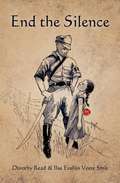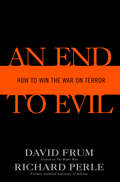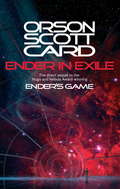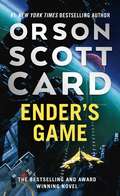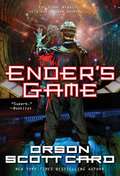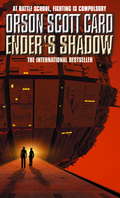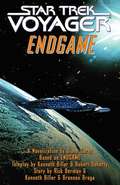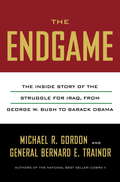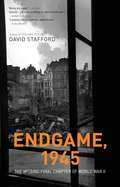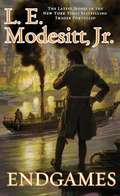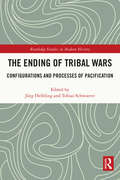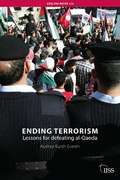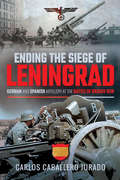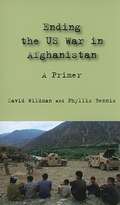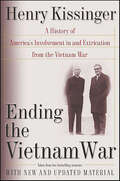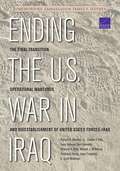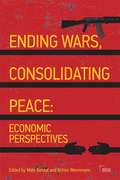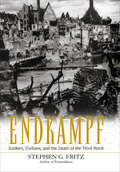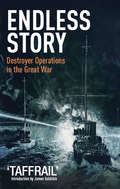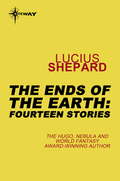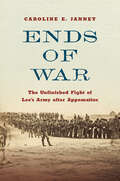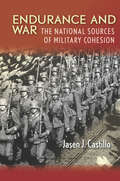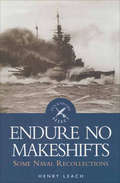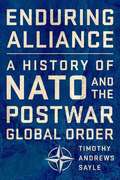- Table View
- List View
End the Silence
by Dorothy Read Ilse Evelijn Veere SmitEnd the Silence tells the story of Ilse, an Indo-European born into an idyllic childhood in the colonial society of the Dutch East Indies. Ilse's privileged life was forever changed when the Japanese invaded her homeland during World War II. She recounts her years of internment in a Japanese concentration camp on Java. Then, at the war's end she walked out of Camp Halmaheira only to walk into the bloody Indonesian revolution where she was targeted for execution by native freedom fighters. Finally, she tells of the pain she suffered trying to cope with her memories in a family that refused to talk about it. As Ilse recalls the scenes in her remarkable journey, Dorothy Read paints them in the words of both the young Ilse who lived them and today's Ilse who reflects upon them.
An End to Evil
by David Frum Richard PerleAn End to Evil charts the agenda for what's next in the war on terrorism, as articulated by David Frum, former presidential speechwriter and bestselling author of The Right Man, and Richard Perle, former assistant secretary of defense and one of the most influential foreign-policy leaders in Washington. This world is an unsafe place for Americans--and the U.S. government remains unready to defend its people. In An End to Evil, David Frum and Richard Perle sound the alert about the dangers around us: the continuing threat from terrorism, the crisis with North Korea, the aggressive ambitions of China. Frum and Perle provide a detailed, candid account of America's vulnerabilities: a military whose leaders resist change, intelligence agencies mired in bureaucracy, diplomats who put friendly relations with their foreign colleagues ahead of the nation's interests. Perle and Frum lay out a bold program to defend America--and to win the war on terror. Among the topics this book addresses: * why the United States risks its security if it submits to the authority of the United Nations * why France and Saudi Arabia have to be treated as adversaries, not allies, in the war on terror * why the United States must take decisive action against Iran--now* what to do in North Korea if negotiations fail* why everything you read in the newspapers about the Israeli-Arab dispute is wrong * how our government must be changed if we are to fight the war on terror to victory--not just stalemate * where the next great terror threat is coming from--and what we can do to protect ourselves An End to Evil will define the conservative point of view on foreign policy for a new generation--and shape the agenda for the 2004 presidential-election year and beyond. With a keen insiders' perspective on how our leaders are confronting--or not confronting--the war on terrorism, David Frum and Richard Perle make a convincing argument for why the toughest line is the safest line.From the Hardcover edition.
Ender In Exile: Book 5 of the Ender Saga (Ender Saga #5)
by Orson Scott Card'The novels of Orson Scott Card's Ender series are an intriguing combination of action, military and political strategy, elaborate war games and psychology.' - USA TODAY'Hugo and Nebula-award winner Orson Scott Card demonstrates again that he belongs in the company of such older masters of science fiction as Isaac Asimov, Frank Herbert and Ursula K. Le Guin.' - Magill Book ReviewsAt first, Ender believed that they would bring him back to Earth as soon as things quieted down. But things were quiet now, had been quiet for a year, and it was plain to him now that they would not bring him back at all, that he was much more useful as a name and a story than he would ever be as an inconveniently flesh-and-blood person.At the close of ENDER'S GAME, Andrew Wiggin - called Ender by everyone - knows that he cannot live on Earth. He has become far more than just a boy who won a game: he is the Saviour of Earth, a hero, a military genius whose allegiance is sought by every nation of the newly shattered Earth Hegemony.He is offered the choice of living under the Hegemon's control, a pawn in his brother Peter's political games. Or he can join the colony ships and go out to settle one of the new worlds won in the war. The story of those years on the colony worlds has never been told . . . until now.The direct sequel to the Hugo and Nebula Award-winning bestseller, ENDER'S GAME.Books by Orson Scott Card:Alvin Maker novelsSeventh SonRed ProphetPrentice AlvinAlvin JourneymanHeartfireThe Crystal CityEnder Wiggin SagaEnder's GameSpeaker for the DeadXenocideChildren of the MindEnder in ExileHomecomingThe Memory of the EarthThe Call of the EarthThe Ships of the EarthEarthfallEarthbornFirst Formic War (with Aaron Johnston)Earth UnawareEarth AfireEarth Awakens
Ender's Game: Response Journal (The Ender Quintet #1)
by Orson Scott CardWinner of the Hugo and Nebula AwardsIn order to develop a secure defense against a hostile alien race's next attack, government agencies breed child geniuses and train them as soldiers. A brilliant young boy, Andrew "Ender" Wiggin lives with his kind but distant parents, his sadistic brother Peter, and the person he loves more than anyone else, his sister Valentine. Peter and Valentine were candidates for the soldier-training program but didn't make the cut—young Ender is the Wiggin drafted to the orbiting Battle School for rigorous military training.Ender's skills make him a leader in school and respected in the Battle Room, where children play at mock battles in zero gravity. Yet growing up in an artificial community of young soldiers Ender suffers greatly from isolation, rivalry from his peers, pressure from the adult teachers, and an unsettling fear of the alien invaders. His psychological battles include loneliness, fear that he is becoming like the cruel brother he remembers, and fanning the flames of devotion to his beloved sister. Is Ender the general Earth needs? But Ender is not the only result of the genetic experiments. The war with the Buggers has been raging for a hundred years, and the quest for the perfect general has been underway for almost as long. Ender's two older siblings are every bit as unusual as he is, but in very different ways. Between the three of them lie the abilities to remake a world. If, that is, the world survives.Ender's Game is the winner of the 1985 Nebula Award for Best Novel and the 1986 Hugo Award for Best Novel.At the Publisher's request, this title is being sold without Digital Rights Management Software (DRM) applied.
Ender's Game (Ender's Game #1)
by Orson Scott CardIn order to develop a secure defense against a hostile alien race's next attack, government agencies breed child geniuses and train them as soldiers. A brilliant young boy, Andrew "Ender" Wiggin lives with his kind but distant parents, his sadistic brother Peter, and the person he loves more than anyone else, his sister Valentine. Peter and Valentine were candidates for the soldier-training program but didn't make the cut — young Ender is the Wiggin drafted to the orbiting Battle School for rigorous military training.<P><P> Ender's skills make him a leader in school and respected in the Battle Room, where children play at mock battles in zero gravity. Yet growing up in an artificial community of young soldiers Ender suffers greatly from isolation, rivalry from his peers, pressure from the adult teachers, and an unsettling fear of the alien invaders. His psychological battles include loneliness, fear that he is becoming like the cruel brother he remembers, and fanning the flames of devotion to his beloved sister.<P> Is Ender the general Earth needs? But Ender is not the only result of the genetic experiments. The war with the Buggers has been raging for a hundred years, and the quest for the perfect general has been underway for almost as long. Ender's two older siblings are every bit as unusual as he is, but in very different ways. Between the three of them lie the abilities to remake a world. If, that is, the world survives.<P> Hugo and Nebula Awards Winner.
Ender's Shadow: Book 1 of The Shadow Saga (Shadow Saga #1)
by Orson Scott Card'The emotional punch is still as powerful as ever. Excellent.' - SFX'Haunting, compulsive, urgently readable...Story-telling genius.' - InterzoneOrson Scott Card is one of the world's bestselling SF authors, and the award-winning Ender saga is one of the best-loved series in the genre. ENDER'S SHADOW is the first volume in a new Ender series. Returning to the time of Ender's Game, ENDER'S SHADOW follows the incredible story of one of Ender Wiggin's fellow pupils at Battle School. Compelling, compulsive reading, ENDER'S SHADOW is certain to thrill all fans of the original series and attract many new readers.The first book in a new Ender series by bestselling author Orson Scott Card.Books by Orson Scott Card:Alvin Maker novelsSeventh SonRed ProphetPrentice AlvinAlvin JourneymanHeartfireThe Crystal CityEnder Wiggin SagaEnder's GameSpeaker for the DeadXenocideChildren of the MindEnder in ExileHomecomingThe Memory of the EarthThe Call of the EarthThe Ships of the EarthEarthfallEarthbornFirst Formic War (with Aaron Johnston)Earth UnawareEarth AfireEarth Awakens
Endgame (Star Trek: Voyager)
by Diane Carey Christie GoldenFor seven tumultuous years, the U.S.S. Voyager has explored the Delta Quadrant, encountering strange alien civilizations and bizarre space-time anomalies as it steadfastly made its way back toward the safety of Federation space. Captain Kathryn Janeway and her heroic crew have faced all manner of harrowing danger and hostile life-forms -- including the Kazons, the Borg, and the Q -- while never losing sight of their ultimate goal: home. Now, at last, Voyager's epic trek may be nearing its end... After so many perilous and astounding adventures, will Captain Janeway finally bring her wayward starship back to the Alpha Quadrant? And what will become of her diverse yet tightly knit crew? Will Chakotay, B'Elanna Torres, and the other former Maquis freedom fighters face long-delayed justice for their crimes against the Federation? And is there any place in Starfleet for the uniquely independent Borg known as Seven of Nine? As the ultimate destiny of Voyager is revealed, all that is certain is that nothing will ever be the same!
The Endgame
by Michael R. Gordon Bernard E. TrainorEagerly anticipated in the wake of their national best seller Cobra II ("The superb, must-read military history of the invasion of Iraq"--Thomas L. Friedman), The Endgame is Michael R. Gordon and General Bernard E. Trainor's most ambitious and news-breaking book to date. A peerless work of investigative journalism and historical recreation ranging from 2003 to 2012, it gives us the first comprehensive, inside account of arguably the most widely reported yet least understood war in American history--from the occupation of Iraq to the withdrawal of American troops. Prodigiously researched, The Endgame is not only based on an abundance of highly classified, still-secret government documents but is also brilliantly informed by access to key figures in the White House, the military, the State and Defense departments, the intelligence community, and, most strikingly, by extensive interviews with both Sunni and Shiite leaders, key Kurdish politicians, tribal sheikhs, former insurgents, Sadrists, and senior Iraqi military officers, whose insights about critical turning points and previously unknown decisions made during the war have heretofore been conspicuously missing from the media's coverage of it. The Endgame is riveting as a blow-by-blow chronicle of the fighting. It is also relentlessly revealing, as it deftly pieces together the puzzle of the prosecution of American, Iraqi, and Iranian objectives, and the diplomatic intrigue and political struggle within Iraq since the American invasion.
Endgame, 1945: The Missing Final Chapter of World War II
by David Stafford"War is too important to be left to the generals," Georges Clemenceau once famously remarked. Stafford (Centre for the Study of the Two World Wars, U. of Edinburgh, UK) adds, "the history of war is too important to be left to the military historians alone," especially as they tend to end their accounts with the immediate cessation of hostilities and neglect the importance of war's aftermath. His method of capturing some of the realities of the final days and immediate aftermath, through mid-summer 1945, of World War II, is to weave together the biographies of "a handful of individuals," including a German mother separated from her sons and imprisoned by the Nazis, a British commando witness to the aftermath of the horrors of the concentration camps, an American soldier in Italy, a war correspondent traveling with Gen. Patton's forces into Germany, a Canadian officer in Holland, a German-Jewish exile serving as a British secret agent in Austria, a New Zealand intelligence officer working in opposition to the communists in the disputed city of Trieste, an American paratrooper in Berlin involved in some the very first manifestations of the Cold War confrontation with the Soviets, and a woman involved with humanitarian work for concentration camp victims. Annotation ©2008 Book News, Inc., Portland, OR (booknews.com)
Endgames (The Imager Portfolio #12)
by L. E. Modesitt Jr.Endgames is the stunning final volume in L. E. Modesitt, Jr's, New York Times bestselling epic fantasy series the Imager Portfolio, and the third book in the story arc that began with Madness in Solidar through Treachery's Tools and Assassin's Price.Solidar is in chaos.Charyn, the young and untested ruler of Solidar, has survived assassination, and he struggles to gain control of a realm in the grip of social upheaval, war, and rioting. Solidar cannot be allowed to slide into social and political turmoil that will leave the High Holders with their ancient power and privilege, and the common people with nothing.But the stakes are even higher than he realizes. <P><P>The Imager Portfolio #1 Imager / #2 Imager’s Challenge / #3 Imager’s Intrigue / #4 Scholar / #5 Princeps / #6 Imager’s Battalion / #7 Antiagon Fire / #8 Rex Regis / #9 Madness in Solidar / #10 Treachery’s Tools / #11 Assassin’s Price / #12 Endgames <P><P> Other series by L. E. Modesitt, Jr. The Saga of RecluceThe Corean ChroniclesThe Spellsong CycleThe Ghost BooksThe Ecolitan Matter <P><P>At the Publisher's request, this title is being sold without Digital Rights Management Software (DRM) applied.
The Ending of Tribal Wars: Configurations and Processes of Pacification (Routledge Studies in Modern History #79)
by Jürg Helbling Tobias SchwoererAll over the world and throughout millennia, states have attempted to subjugate, control and dominate non-state populations and to end their wars. This book compares such processes of pacification leading to the end of tribal warfare in seven societies from all over the world between the 19th and 21st centuries. It shows that pacification cannot be understood solely as a unilateral imposition of state control but needs to be approached as the result of specific interactions between state actors and non-state local groups. Indigenous groups usually had options in deciding between accepting and resisting state control. State actors often had to make concessions or form alliances with indigenous groups in order to pursue their goals. Incentives given to local groups sometimes played a more important role in ending warfare than repression. In this way, indigenous groups, in interaction with state actors, strongly shaped the character of the process of pacification. This volume’s comparison finds that pacification is more successful and more durable where state actors mainly focus on selective incentives for local groups to renounce warfare, offer protection, and only as a last resort use moderate repression, combined with the quick establishment of effective institutions for peaceful conflict settlement.
Ending Terrorism: Lessons for defeating al-Qaeda (Adelphi series)
by Audrey Kurth CroninLike all other terrorist movements, al-Qaeda will end. While it has traits that exploit and reflect the current international context, it is not utterly without precedent: some aspects of al-Qaeda are unusual, but many are not. Terrorist groups end according to recognisable patterns that have persisted for centuries, and they reflect, among other factors, the counter-terrorist policies taken against them. It makes sense to formulate those policies with a specific image of an end in mind. Understanding how terrorism ends is the best way to avoid being manipulated by the tactic. There is vast historical experience with the decline and ending of terrorist campaigns, yet few policymakers are familiar with it. This paper first explains five typical strategies of terrorism and why Western thinkers fail to grasp them. It then describes historical patterns in ending terrorism to suggest how insights from that history can lay a foundation for more effective counter-strategies. Finally, it extracts policy prescriptions specifically relevant to ending the campaign of al-Qaeda and its associates, moving towards a post-al-Qaeda world.
Ending the Siege of Leningrad: German and Spanish Artillery at the Battle of Krasny Bor
by Carlos Caballero JuradoThis vivid combat history examines the role of German and Spanish artillery in the WW2 fight for control of Leningrad.When Nazi Germany invaded the Soviet Union in 1941, it quickly established a blockade around Leningrad that would become one of the longest and most destructive in history. In an attempt to break the blockade in 1943, the Red Army launched an offensive near the town of Krasny Bor. Previous works on the Battle of Krasny Bor have focused on the infantry involved, while little attention has been paid to the use of German and Spanish artillery in the conflict. In Ending the Siege of Leningrad, Spanish military historian Carlos Caballero Jurado corrects this oversight. Describing the action from an artilleryman’s point of view, Jurado puts the reader in the heart of the battle.
Ending the US War in Afghanistan: A Primer
by David Wildman Phyllis BennisThe Bush Administration answered the terror attacks of September 11, 2001 with what it called the "global war on terror," first with the assault on Afghanistan and then the invasion of Iraq. More and more Americans joined the opposition to the Iraq war, but for many, Afghanistan remained "the good war." But was the war on Afghanistan ever a "good war?" And will President Obama's planned escalation of US troop presence in Afghanistan work? In this easy-to-read volume of "frequently asked questions," analysts David Wildman and Phyllis Bennis examine a wide range of key issues regarding the US war in Afghanistan.
Ending the Vietnam War: A History of America's Involvement in and Extrication from the Vietnam War
by Henry KissingerNow, for the first time, Kissinger gives us in a single volume an in-depth, inside view of the Vietnam War, personally collected, annotated, revised, and updated from his bestselling memoirs and his book Diplomacy.Many other authors have written about what they thought happened—or thought should have happened—in Vietnam, but it was Henry Kissinger who was there at the epicenter, involved in every decision from the long, frustrating negotiations with the North Vietnamese delegation to America's eventual extrication from the war.Here, Kissinger writes with firm, precise knowledge, supported by meticulous documentation that includes his own memoranda to and replies from President Nixon. He tells about the tragedy of Cambodia, the collateral negotiations with the Soviet Union and the People's Republic of China, the disagreements within the Nixon and Ford administrations, the details of all negotiations in which he was involved, the domestic unrest and protest in the States, and the day-to-day military to diplomatic realities of the war as it reached the White House.As compelling and exciting as Barbara Tuchman's The Guns of August, Ending the Vietnam War also reveals insights about the bigger-than-life personalities—Johnson, Nixon, de Gaulle, Ho Chi Minh, Brezhnev—who were caught up in a war that forever changed international relations. This is history on a grand scale, and a book of overwhelming importance to the public record.
Ending The U.s. War In Iraq
by Richard R. Brennan Charles P. Ries Larry Hanauer Ben Connable Terrence K. KellyEnding the U. S. war in Iraq required redeploying 100,000 military and civilian personnel; handing off responsibility for 431 activities to the Iraqi government, U. S. embassy, USCENTCOM, or other U. S. government entities; and moving or transferring ownership of over a million pieces of property in accordance with U. S. and Iraqi laws, national policy, and DoD requirements. This book examines the planning and execution of this transition.
Ending Wars, Consolidating Peace: Economic Perspectives (Adelphi series)
by Mats Berdal Achim WennmannThe transition from war to peace is fraught with tension and the risk of a return to bloodshed. With so much at stake, it is crucial that the international community and local stakeholders make sense of the complex mosaic of challenges, to support a lasting, inclusive and prosperous peace. Recent missions, such as in Afghanistan, Somalia, or Sudan, have highlighted the fact that there can be no one-size-fits-all approach to steering countries away from violence and towards stability. This Adelphi offers a series of economic perspectives on conflict resolution, to show how the challenges of peacebuilding can be more effectively tackled. From the need to marry diplomatic peacemaking with development efforts, and activate the private sector in the service of peacebuilding aims, to the use of taxes and natural resource revenues as a financial base for sustainable peace, this book considers how economic factors can positively shape and drive peace processes. It takes an unflinching look at the complex ways in which power and order may be manifested in conflict zones, where unpalatable compromises with local warlords can often be the first step towards a more lasting settlement. A difficult balance must be struck by peacemakers and peacebuilders in assisting countries and communities in their transitions out of war, for the consequences of failure for countries and the wider world are too grave. In distilling expertise from a range of disciplines, this Adelphi seeks to inform a more economically integrated and responsive approach to helping countries leave behind their troubled pasts and take a fuller role in constructing their futures.
Endkampf: Soldiers, Civilians, and the Death of the Third Reich
by Stephen G. FritzAt the end of World War II, Gen. Dwight D. Eisenhower, fearing that retreating Germans would consolidate large numbers of troops in an Alpine stronghold and from there conduct a protracted guerilla war, turned U.S. forces toward the heart of Franconia, ordering them to cut off and destroy German units before they could reach the Alps. Opposing this advance was a conglomeration of German forces headed by SS-Gruppenführer Max Simon, a committed National Socialist who advocated merciless resistance. Under the direction of officers schooled in harsh combat in Russia, the Germans succeeded in bringing the American advance to a grinding halt. Caught in the middle were the people of Franconia. Historians have accorded little mention to this period of violence and terror, but it provides insight into the chaotic nature of life while the Nazi regime was crumbling. Neither German civilians nor foreign refugees acted simply as passive victims caught between two fronts. Throughout the region people pressured local authorities to end the senseless resistance and sought revenge for their tribulations in the "liberation" that followed. Stephen G. Fritz examines the predicament and outlook of American GI's, German soldiers and officials, and the civilian population caught in the arduous fighting during the waning days of World War II. Endkampf is a gripping portrait of the collapse of a society and how it affected those involved, whether they were soldiers or civilians, victors or vanquished, perpetrators or victims.
Endless Story: Destroyer Operations in the Great War
by James GoldrickAlthough it was first published in 1931, Endless Story remains the only comprehensive account of the services of the Navys small craft destroyers, torpedo boats and patrol vessels during the First World War, and moreover the only one written by an officer personally involved. Even if Dorling did not take part in all the actions he describes, he knew the men who did, and gleaned much of his information from personal contact. As a result the book has both authenticity and authority, but is composed with the all verve of the popular novelist that Taffrail was to become. It was a bestseller in its day, and now enjoys the status of a classic.
The Ends of the Earth: Fourteen Stories
by Lucius ShepardLucius Shepard's short fiction ranges far and wide over the field of SF and fantasy, and is crammed with show-stopper ideas and an intense originality. The Ends of the Earth is a testimonial to a genius of the genre, and a major American writer. Winner of the 1992 World Fantasy Award for Best Collection.Contents:The Ends of the Earth (1989)Delta Sly Honey (1987)Bound for Glory (1989)The Exercise of Faith (1987)Nomans Land (1988)Life of Buddha (1988)Shades (1987)Aymara (1986)A Wooden Tiger (1988)The Black Clay Boy (1987)Fire Zone Emerald (1985)On the Border (1987)The Scalehunter's Beautiful Daughter (1988)Surrender (1989)
Ends of War: The Unfinished Fight of Lee's Army after Appomattox
by Caroline E. JanneyThe Army of Northern Virginia's chaotic dispersal began even before Lee and Grant met at Appomattox Court House. As the Confederates had pushed west at a relentless pace for nearly a week, thousands of wounded and exhausted men fell out of the ranks. When word spread that Lee planned to surrender, most remaining troops stacked their arms and accepted paroles allowing them to return home, even as they lamented the loss of their country and cause. But others broke south and west, hoping to continue the fight. Fearing a guerrilla war, Grant extended the generous Appomattox terms to every rebel who would surrender himself. Provost marshals fanned out across Virginia and beyond, seeking nearly 18,000 of Lee's men who had yet to surrender. But the shock of Lincoln's assassination led Northern authorities to see threats of new rebellion in every rail depot and harbor where Confederates gathered for transport, even among those already paroled. While Federal troops struggled to keep order and sustain a fragile peace, their newly surrendered adversaries seethed with anger and confusion at the sight of Union troops occupying their towns and former slaves celebrating freedom. In this dramatic new history of the weeks and months after Appomattox, Caroline E. Janney reveals that Lee's surrender was less an ending than the start of an interregnum marked by military and political uncertainty, legal and logistical confusion, and continued outbursts of violence. Janney takes readers from the deliberations of government and military authorities to the ground-level experiences of common soldiers. Ultimately, what unfolds is the messy birth narrative of the Lost Cause, laying the groundwork for the defiant resilience of rebellion in the years that followed.
Endurance and War: The National Sources of Military Cohesion
by Jasen J. CastilloScholars and military practitioners alike have long sought to understand why some country's militaries fight hard when facing defeat while others collapse. In Endurance and War, Jasen Castillo presents a new unifying theory—cohesion theory—to explain why national militaries differ in their staying power. His argument builds on insights from the literatures on group solidarity in general and military effectiveness in particular, which argue that the stronger the ties binding together individuals in a group of any kind, the higher the degree of cohesion that a group will exhibit when taking collective action, including fighting in war. Specifically, he argues that two types of ties determine the cohesion, and therefore the resilience, of a nation's armed forces during war: the degree of control a regime holds over its citizens and the amount of autonomy the armed forces possess to focus on training for warfighting. Understanding why armed forces differ in their cohesion should help U.S. military planners better assess the military capabilities of potential adversaries, like Iran and North Korea. For scholars of international politics, cohesion theory can help provide insights into how countries create military power and how they win wars.
Endure (Need Pixies #4)
by Carrie JonesRescuing Nick should have made all of Zara's problems disappear. Bedford's greatest warrior is back, not to mention Zara's true soul mate. But it seems it isn't enough. Nick isn't enough. Bedford is being ravaged by evil pixies and they need much more than one great warrior; they need an army to stop the impended apocalypse. Zara isn't sure what her role is anymore. She's not just fighting for her friends, she's also a pixie queen. And to align her team of pixies with the humans she loves will be one of her greatest battles yet. Especially since she can't even reconcile her growing, heart-pounding feelings for her pixie king.... Unexpected turns, surprising revelations, and one utterly satisfying romantic finale make Endure a thrilling end to this acclaimed series.
Endure No Makeshifts: Some Naval Recollections
by Henry LeachSir Henry Leach spent forty-five years of active service in the Royal Navy, starting as a thirteen year old Cadet in 1937 and finishing as a fifty-nine year old Admiral of the Fleet in 1982. Son of a distinguished naval Captain, killed in action while commanding the Battleship Prince of Wales in 1941, he spent most of World War II at sea, mainly in the North Atlantic and the Far East.
Enduring Alliance: A History Of Nato And The Postwar Global Order
by Timothy Andrews SayleBorn from necessity, the North Atlantic Treaty Organization (NATO) has always seemed on the verge of collapse. Even now, some seventy years after its inception, some consider its foundation uncertain and its structure weak. At this moment of incipient strategic crisis, Timothy A. Sayle offers a sweeping history of the most critical alliance in the post-World War II era. In Enduring Alliance, Sayle recounts how the western European powers, along with the United States and Canada, developed a treaty to prevent encroachments by the Soviet Union and to serve as a first defense in any future military conflict. As the growing and unruly hodgepodge of countries, councils, commands, and committees inflated NATO during the Cold War, Sayle shows that the work of executive leaders, high-level diplomats, and institutional functionaries within NATO kept the alliance alive and strong in the face of changing administrations, various crises, and the flux of geopolitical maneuverings. Resilience and flexibility have been the true hallmarks of NATO. As Enduring Alliance deftly shows, the history of NATO is organized around the balance of power, preponderant military forces, and plans for nuclear war. But it is also the history riven by generational change, the introduction of new approaches to conceiving international affairs, and the difficulty of diplomacy for democracies. As NATO celebrates its seventieth anniversary, the alliance once again faces challenges to its very existence even as it maintains its place firmly at the center of western hemisphere and global affairs.
